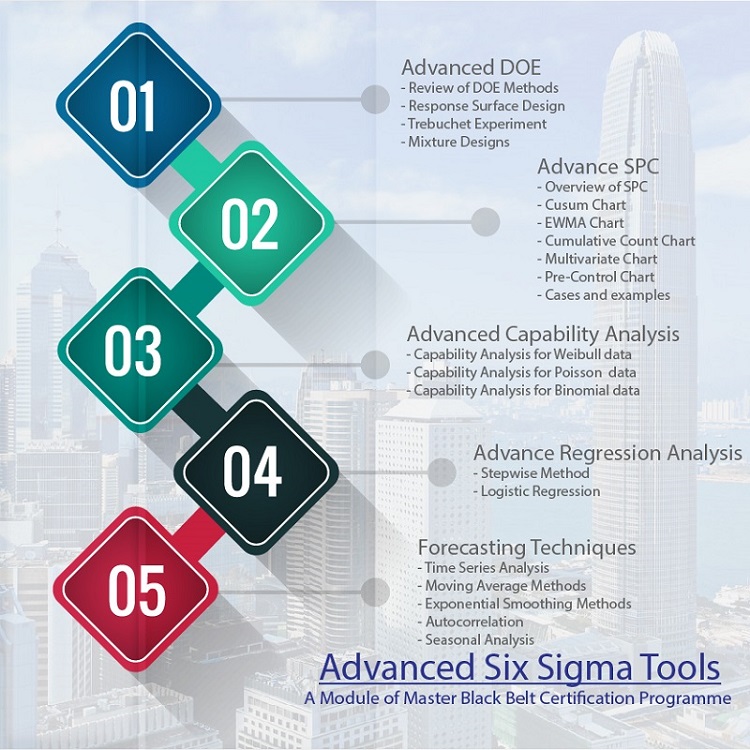Contents
Advanced Six Sigma Tools
A Module of Master Black Belt Certification Programme
Course Overview
Six Sigma is a widely used methodology for measuring and improving an organization’s operational performance through a rigorous analysis of its practices and systems. The Six Sigma projects deliver through the application of well-defined set of statistical tools and process improvement techniques.
A company committing itself to a Six Sigma project must put in place an intensive training program for key executives and staff. In turn, these people learn to organize and effectively lead the deployment of the project, and to implement and use statistical tools and analytical techniques in their business-improvement efforts. This course is aimed at introducing various advanced Six Sigma tools as well as providing the knowledge on applying the appropriate techniques to tackle the problems. Such tools and methods include the advanced level of DOE, SPC, Capability Analysis and Regression Analysis. In-depth knowledge in deploying those Six Sigma tools will be discussed.
Who should attend?
1. First and second level team leaders and managers.
2. Quality and process improvement professionals.
3. Those interested in becoming Six Sigma professionals.
Course Outline
2.0 Review of Hypothesis Testing and Regression Analysis
2.1 Advanced DOE2.1.1 Review of DOE Methods
2.1.2 Response Surface Design2.1.2.1 Central Composite and Box-Behnken Designs
2.1.2.2 Sequential Experimentation
2.1.2.3 Optimization
2.1.2.4 Steepest Ascent Method
2.1.2.5 Multiple Response2.1.3 Trebuchet Experiment
2.1.4 Mixture Designs2.2 Advance SPC2.2.1 Overview of SPC
2.2.2 Cusum Chart
2.2.3 EWMA Chart
2.2.4 Cumulative Count Chart
2.2.5 Multivariate Chart
2.2.6 Pre-Control Chart
2.2.7 Cases and examples2.3 Advanced Capability Analysis2.3.1 Capability Analysis for Weibull data
2.3.2 Capability Analysis for Poisson data
2.3.3 Capability Analysis for Binomial data2.4 Advance Regression Analysis2.4.1 Stepwise Method
2.4.2 Logistic Regression2.5 Forecasting Techniques2.5.1 Time Series Analysis
2.5.2 Moving Average Methods
2.5.3 Exponential Smoothing Methods
2.5.4 Autocorrelation
2.5.5 Seasonal Analysis
2.6 Simulation and Exercise
Certification
Participants who complete the course and pass the examination will be awarded a module certificate.
CPD credits could be claimed:
30 credits
Course Fee
Please contact us for details.













